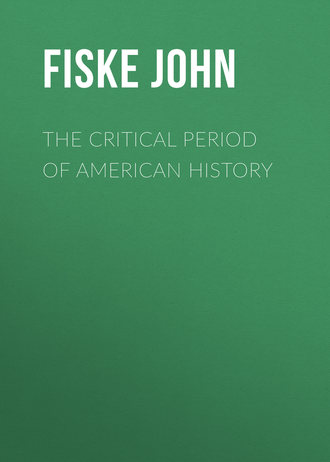 полная версия
полная версияThe Critical Period of American History

John Fiske
The Critical Period of American History
PREFACE
This book contains the substance of the course of lectures given in the Old South Meeting-House in Boston in December, 1884, at the Washington University in St. Louis in May, 1885, and in the theatre of the University Club in New York in March, 1886. In its present shape it may serve as a sketch of the political history of the United States from the end of the Revolutionary War to the adoption of the Federal Constitution. It makes no pretensions to completeness, either as a summary of the events of that period or as a discussion of the political questions involved in them. I have aimed especially at grouping facts in such a way as to bring out and emphasize their causal sequence, and it is accordingly hoped that the book may prove useful to the student of American history.
My title was suggested by the fact of Thomas Paine's stopping the publication of the "Crisis," on hearing the news of the treaty of 1783, with the remark, "The times that tried men's souls are over." Commenting upon this, on page 55 of the present work, I observed that so far from the crisis being over in 1783, the next five years were to be the most critical time of all. I had not then seen Mr. Trescot's "Diplomatic History of the Administrations of Washington and Adams," on page 9 of which he uses almost the same words: "It must not be supposed that the treaty of peace secured the national life. Indeed, it would be more correct to say that the most critical period of the country's history embraced the time between 1783 and the adoption of the Constitution in 1788."
That period was preëminently the turning-point in the development of political society in the western hemisphere. Though small in their mere dimensions, the events here summarized were in a remarkable degree germinal events, fraught with more tremendous alternatives of future welfare or misery for mankind than it is easy for the imagination to grasp. As we now stand upon the threshold of that mighty future, in the light of which all events of the past are clearly destined to seem dwindled in dimensions and significant only in the ratio of their potency as causes; as we discern how large a part of that future must be the outcome of the creative work, for good or ill, of men of English speech; we are put into the proper mood for estimating the significance of the causes which determined a century ago that the continent of North America should be dominated by a single powerful and pacific federal nation instead of being parcelled out among forty or fifty small communities, wasting their strength and lowering their moral tone by perpetual warfare, like the states of ancient Greece, or by perpetual preparation for warfare, like the nations of modern Europe. In my book entitled "American Political Ideas, viewed from the Standpoint of Universal History," I have tried to indicate the pacific influence likely to be exerted upon the world by the creation and maintenance of such a political structure as our Federal Union. The present narrative may serve as a commentary upon what I had in mind on page 133 of that book, in speaking of the work of our Federal Convention as "the finest specimen of constructive statesmanship that the world has ever seen." On such a point it is pleasant to find one's self in accord with a statesman so wise and noble as Mr. Gladstone, whose opinion is here quoted on page 223.
To some persons it may seem as if the years 1861–65 were of more cardinal importance than the years 1783–89. Our civil war was indeed an event of prodigious magnitude, as measured by any standard that history affords; and there can be little doubt as to its decisiveness. The measure of that decisiveness is to be found in the completeness of the reconciliation that has already, despite the feeble wails of unscrupulous place-hunters and unteachable bigots, cemented the Federal Union so powerfully that all likelihood of its disruption may be said to have disappeared forever. When we consider this wonderful harmony which so soon has followed the deadly struggle, we may well believe it to be the index of such a stride toward the ultimate pacification of mankind as was never made before. But it was the work done in the years 1783–89 that created a federal nation capable of enduring the storm and stress of the years 1861–65. It was in the earlier crisis that the pliant twig was bent; and as it was bent, so has it grown; until it has become indeed a goodly and a sturdy tree.
Cambridge, October 10, 1888.
CHAPTER I.
RESULTS OF YORKTOWN
Sympathy between British Whigs and the revolutionary party in America.
The 20th of March, 1782, the day which witnessed the fall of Lord North's ministry, was a day of good omen for men of English race on both sides of the Atlantic. Within two years from this time, the treaty which established the independence of the United States was successfully negotiated at Paris; and at the same time, as part of the series of events which resulted in the treaty, there went on in England a rapid dissolution and reorganization of parties, which ended in the overwhelming defeat of the king's attempt to make the forms of the constitution subservient to his selfish purposes, and established the liberty of the people upon a broader and sounder basis than it had ever occupied before. Great indignation was expressed at the time, and has sometimes been echoed by British historians, over the conduct of those Whigs who never lost an opportunity of expressing their approval of the American revolt. The Duke of Richmond, at the beginning of the contest, expressed a hope that the Americans might succeed, because they were in the right. Charles Fox spoke of General Howe's first victory as "the terrible news from Long Island." Wraxall says that the celebrated buff and blue colours of the Whig party were adopted by Fox in imitation of the Continental uniform; but his unsupported statement is open to question. It is certain, however, that in the House of Commons the Whigs habitually alluded to Washington's army as "our army," and to the American cause as "the cause of liberty;" and Burke, with characteristic vehemence, declared that he would rather be a prisoner in the Tower with Mr. Laurens than enjoy the blessings of freedom in company with the men who were seeking to enslave America. Still more, the Whigs did all in their power to discourage enlistments, and in various ways so thwarted and vexed the government that the success of the Americans was by many people ascribed to their assistance. A few days before Lord North's resignation, George Onslow, in an able defence of the prime minister, exclaimed, "Why have we failed so miserably in this war against America, if not from the support and countenance given to rebellion in this very House?"
It weakened the Whigs in England.
Character of Lord Shelburne.
Now the violence of party leaders like Burke and Fox owed much of its strength, no doubt, to mere rancorousness of party spirit. But, after making due allowance for this, we must admit that it was essentially based upon the intensity of their conviction that the cause of English liberty was inseparably bound up with the defeat of the king's attempt upon the liberties of America. Looking beyond the quarrels of the moment, they preferred to have freedom guaranteed, even at the cost of temporary defeat and partial loss of empire. Time has shown that they were right in this, but the majority of the people could hardly be expected to comprehend their attitude. It seemed to many that the great Whig leaders were forgetting their true character as English statesmen, and there is no doubt that for many years this was the chief source of the weakness of the Whig party. Sir Gilbert Elliot said, with truth, that if the Whigs had not thus to a considerable extent arrayed the national feeling against themselves, Lord North's ministry would have fallen some years sooner than it did. The king thoroughly understood the advantage which accrued to him from this state of things; and with that short-sighted shrewdness of the mere political wire-puller, in which few modern politicians have excelled him, he had from the outset preferred to fight his battle on constitutional questions in America rather than in England, in order that the national feeling of Englishmen might be arrayed on his side. He was at length thoroughly beaten on his own ground, and as the fatal day approached he raved and stormed as he had not stormed since the spring of 1778, when he had been asked to entrust the government to Lord Chatham. Like the child who refuses to play when he sees the game going against him, George threatened to abdicate the throne and go over to Hanover, leaving his son to get along with the Whig statesmen. But presently he took heart again, and began to resort to the same kind of political management which had served him so well in the earlier years of his reign. Among the Whig statesmen, the Marquis of Buckingham had the largest political following. He represented the old Whig aristocracy, his section of the party had been first to urge the recognition of American independence, and his principal followers were Fox and Burke. For all these reasons he was especially obnoxious to the king. On the other hand, the Earl of Shelburne was, in a certain sense, the political heir of Lord Chatham, and represented principles far more liberal than those of the Old Whigs. Shelburne was one of the most enlightened statesmen of his time. He was an earnest advocate of parliamentary reform and of free trade. He had paid especial attention to political economy, and looked with disgust upon the whole barbaric system of discriminative duties and commercial monopolies which had been so largely instrumental in bringing about the American Revolution. But being in these respects in advance of his age, Lord Shelburne had but few followers. Moreover, although a man of undoubted integrity, quite exempt from sordid or selfish ambition, there was a cynical harshness about him which made him generally disliked and distrusted. He was so suspicious of other men that other men were suspicious of him; so that, in spite of many admirable qualities, he was extremely ill adapted for the work of a party manager.
It was doubtless for these reasons that the king, when it became clear that a new government must be formed, made up his mind that Lord Shelburne would be the safest man to conduct it. In his hands the Whig power would not be likely to grow too strong, and dissensions would be sure to arise, from which the king might hope to profit. The first place in the treasury was accordingly offered to Shelburne; and when he refused it, and the king found himself forced to appeal to Lord Rockingham, the manner in which the bitter pill was taken was quite characteristic of George III. He refused to meet Rockingham in person, but sent all his communications to him through Shelburne, who, thus conspicuously singled out as the object of royal preference, was certain to incur the distrust of his fellow ministers.
Political instability of the Rockingham ministry.
The structure of the new cabinet was unstable enough, however, to have satisfied even such an enemy as the king. Beside Rockingham himself, Lord John Cavendish, Charles Fox, Lord Keppel, and the Duke of Richmond were all Old Whigs. To offset these five there were five New Whigs, the Duke of Grafton, Lords Shelburne, Camden, and Ashburton, and General Conway; while the eleventh member was none other than the Tory chancellor, Lord Thurlow, who was kept over from Lord North's ministry. Burke was made paymaster of the forces, but had no seat in the cabinet. In this curiously constructed cabinet, the prime minister, Lord Rockingham, counted for little. Though a good party leader, he was below mediocrity as a statesman, and his health was failing, so that he could not attend to business. The master spirits were the two secretaries of state, Fox and Shelburne, and they wrangled perpetually, while Thurlow carried the news of all their quarrels to the king, and in cabinet meetings usually voted with Shelburne. The ministry had not lasted five weeks when Fox began to predict its downfall. On the great question of parliamentary reform, which was brought up in May by the young William Pitt, the government was hopelessly divided. Shelburne's party was in favour of reform, and this time Fox was found upon the same side, as well as the Duke of Richmond, who went so far as to advocate universal suffrage. On the other hand, the Whig aristocracy, led by Rockingham, were as bitterly opposed as the king himself to any change in the method of electing parliaments; and, incredible as it may seem, even such a man as Burke maintained that the old system, rotten boroughs and all, was a sacred part of the British Constitution, which none could handle rudely without endangering the country! But in this moment of reaction against the evil influences which had brought about the loss of the American colonies, there was a strong feeling in favour of reform, and Pitt's motion was only lost by a minority of twenty in a total vote of three hundred. Half a century was to elapse before the reformers were again to come so near to victory.
But Lord Rockingham's weak and short-lived ministry was nevertheless remarkable for the amount of good work it did in spite of the king's dogged opposition. It contained great administrative talent, which made itself felt in the most adverse circumstances. To add to the difficulty, the ministry came into office at the critical moment of a great agitation in Ireland. In less than three months, not only was the trouble successfully removed, but the important bills for disfranchising revenue officers and excluding contractors from the House of Commons were carried, and a tremendous blow was thus struck at the corrupt influence of the crown upon elections. Burke's great scheme of economical reform was also put into operation, cutting down the pension list and diminishing the secret service fund, and thus destroying many sources of corruption. At no time, perhaps, since the expulsion of the Stuarts, had so much been done toward purifying English political life as during the spring of 1782. But during the progress of these important measures, the jealousies and bickerings in the cabinet became more and more painfully apparent, and as the question of peace with America came into the foreground, these difficulties hastened to a crisis.
Obstacles in the way of a treaty of peace.
From the policy which George III. pursued with regard to Lord Shelburne at this time, one would suppose that in his secret heart the king wished, by foul means since all others had failed, to defeat the negotiations for peace and to prolong the war. Seldom has there been a more oddly complicated situation. Peace was to be made with America, France, Spain, and Holland. Of these powers, America and France were leagued together by one treaty of alliance, and France and Spain by another, and these treaties in some respects conflicted with one another in the duties which they entailed upon the combatants. Spain, though at war with England for purposes of her own, was bitterly hostile to the United States; and France, thus leagued with two allies which pulled in opposite directions, felt bound to satisfy both, while pursuing her own ends against England. To deal with such a chaotic state of things, an orderly and harmonious government in England should have seemed indispensably necessary. Yet on the part of England the negotiation of a treaty of peace was to be the work of two secretaries of state who were both politically and personally hostile to each other. Fox, as secretary of state for foreign affairs, had to superintend the negotiations with France, Spain, and Holland. Shelburne was secretary of state for home and colonial affairs; and as the United States were still officially regarded as colonies, the American negotiations belonged to his department. With such a complication of conflicting interests, George III. might well hope that no treaty could be made.
Oswald talks with Franklin.
The views of Fox and Shelburne as to the best method of conceding American independence were very different. Fox understood that France was really in need of peace, and he believed that she would not make further demands upon England if American independence should once be recognized. Accordingly, Fox would have made this concession at once as a preliminary to the negotiation. On the other hand, Shelburne felt sure that France would insist upon further concessions, and he thought it best to hold in reserve the recognition of independence as a consideration to be bargained for. Informal negotiations began between Shelburne and Franklin, who for many years had been warm friends. In view of the impending change of government, Franklin had in March sent a letter to Shelburne, expressing a hope that peace might soon be restored. When the letter reached London the new ministry had already been formed, and Shelburne, with the consent of the cabinet, answered it by sending over to Paris an agent, to talk with Franklin informally, and ascertain the terms upon which the Americans would make peace. The person chosen for this purpose was Richard Oswald, a Scotch merchant, who owned large estates in America, – a man of very frank disposition and liberal views, and a friend of Adam Smith. In April, Oswald had several conversations with Franklin. In one of these conversations Franklin suggested that, in order to make a durable peace, it was desirable to remove all occasion for future quarrel; that the line of frontier between New York and Canada was inhabited by a lawless set of men, who in time of peace would be likely to breed trouble between their respective governments; and that therefore it would be well for England to cede Canada to the United States. A similar reasoning would apply to Nova Scotia. By ceding these countries to the United States it would be possible, from the sale of unappropriated lands, to indemnify the Americans for all losses of private property during the war, and also to make reparation to the Tories, whose estates had been confiscated. By pursuing such a policy, England, which had made war on America unjustly, and had wantonly done it great injuries, would achieve not merely peace, but reconciliation, with America; and reconciliation, said Franklin, is "a sweet word." No doubt this was a bold tone for Franklin to take, and perhaps it was rather cool in him to ask for Canada and Nova Scotia; but he knew that almost every member of the Whig ministry had publicly expressed the opinion that the war against America was an unjust and wanton war; and being, moreover, a shrewd hand at a bargain, he began by setting his terms high. Oswald doubtless looked at the matter very much from Franklin's point of view, for on the suggestion of the cession of Canada he expressed neither surprise nor reluctance. Franklin had written on a sheet of paper the main points of his conversation, and, at Oswald's request, he allowed him to take the paper to London to show to Lord Shelburne, first writing upon it a note expressly declaring its informal character. Franklin also sent a letter to Shelburne, describing Oswald as a gentleman with whom he found it very pleasant to deal. On Oswald's arrival in London, Shelburne did not show the notes of the conversation to any of his colleagues, except Lord Ashburton. He kept the paper over one night, and then returned it to Franklin without any formal answer. But the letter he showed to the cabinet, and on the 23d of April it was decided to send Oswald back to Paris, to represent to Franklin that, on being restored to the same situation in which she was left by the treaty of 1763, Great Britain would be willing to recognize the independence of the United States. Fox was authorized to make a similar representation to the French government, and the person whom he sent to Paris for this purpose was Thomas Grenville, son of the author of the Stamp Act.
As all British subjects were prohibited from entering into negotiations with the revolted colonies, it was impossible for Oswald to take any decisive step until an enabling act should be carried through Parliament. But while waiting for this he might still talk informally with Franklin. Fox thought that Oswald's presence in Paris indicated a desire on Shelburne's part to interfere with the negotiations with the French government; and indeed, the king, out of his hatred of Fox and his inborn love of intrigue, suggested to Shelburne that Oswald "might be a useful check on that part of the negotiation which was in other hands." But Shelburne paid no heed to this crooked advice, and there is nothing to show that he had the least desire to intrigue against Fox. If he had, he would certainly have selected some other agent than Oswald, who was the most straightforward of men, and scarcely close-mouthed enough for a diplomatist. He told Oswald to impress it upon Franklin that if America was to be independent at all she must be independent of the whole world, and must not enter into any secret arrangement with France which might limit her entire freedom of action in the future. To the private memorandum which desired the cession of Canada for three reasons, his answers were as follows: "1. By way of reparation.– Answer. No reparation can be heard of. 2. To prevent future wars.– Answer. It is to be hoped that some more friendly method will be found. 3. As a fund of indemnification to loyalists.– Answer. No independence to be acknowledged without their being taken care of." Besides, added Shelburne, the Americans would be expected to make some compensation for the surrender of Charleston, Savannah, and the city of New York, still held by British troops. From this it appears that Shelburne, as well as Franklin, knew how to begin by asking more than he was likely to get.
Grenville has an interview with Vergennes.
While Oswald submitted these answers to Franklin, Grenville had his interview with Vergennes, and told him that, if England recognized the independence of the United States, she should expect France to restore the islands of the West Indies which she had taken from England. Why not, since the independence of the United States was the sole avowed object for which France had gone to war? Now this was on the 8th of May, and the news of the destruction of the French fleet in the West Indies, nearly four weeks ago, had not yet reached Europe. Flushed with the victories of Grasse, and exulting in the prowess of the most formidable naval force that France had ever sent out, Vergennes not only expected to keep the islands which he had got, but was waiting eagerly for the news that he had acquired Jamaica into the bargain. In this mood he returned a haughty answer to Grenville. He reminded him that nations often went to war for a specified object, and yet seized twice as much if favoured by fortune; and, recurring to the instance which rankled most deeply in the memories of Frenchmen, he cited the events of the last war. In 1756 England went to war with France over the disputed right to some lands on the Ohio River and the Maine frontier. After seven years of fighting she not only kept these lands, but all of Canada, Louisiana, and Florida, and ousted the French from India into the bargain. No, said Vergennes, he would not rest content with the independence of America. He would not even regard such an offer as a concession to France in any way, or as a price in return for which France was to make a treaty favourable to England. As regards the recognition of independence, England must treat directly with America.
Effects of Rodney's victory.
Fall of the Rockingham ministry, July 1, 1782.
Grenville was disappointed and chagrined by this answer, and the ministry made up their minds that there would be no use in trying to get an honourable peace with France for the present. Accordingly, it seemed better to take Vergennes at his word, though not in the sense in which he meant it, and, by granting all that the Americans could reasonably desire, to detach them from the French alliance as soon as possible. On the 18th of May there came the news of the stupendous victory of Rodney over Grasse, and all England rang with jubilee. Again it had been shown that "Britannia rules the wave;" and it seemed that, if America could be separately pacified, the House of Bourbon might be successfully defied. Accordingly, on the 23d, five days after the news of victory, the ministry decided "to propose the independence of America in the first instance, instead of making it the condition of a general treaty." Upon this Fox rather hastily maintained that the United States were put at once into the position of an independent and foreign power, so that the business of negotiating with them passed from Shelburne's department into his own. Shelburne, on the other hand, argued that, as the recognition of independence could not take effect until a treaty of peace should be concluded, the negotiation with America still belonged to him, as secretary for the colonies. Following Fox's instructions, Grenville now claimed the right of negotiating with Franklin as well as with Vergennes; but as his written credentials only authorized him to treat with France, the French minister suspected foul play, and turned a cold shoulder to Grenville. For the same reason, Grenville found Franklin very reserved and indisposed to talk on the subject of the treaty. While Grenville was thus rebuffed and irritated he had a talk with Oswald, in the course of which he got from that simple and high-minded gentleman the story of the private paper relating to the cession of Canada, which Franklin had permitted Lord Shelburne to see. Grenville immediately took offence; he made up his mind that something underhanded was going on, and that this was the reason for the coldness of Franklin and Vergennes; and he wrote an indignant letter about it to Fox. From the wording of this letter, Fox got the impression that Franklin's proposal was much more serious than it really was. It naturally puzzled him and made him angry, for the attitude of America implied in the request for a cession of Canada was far different from the attitude presumed by the theory that the mere offer of independence would be enough to detach her from her alliance with France. The plan of the ministry seemed imperilled. Fox showed Grenville's letter to Rockingham, Richmond, and Cavendish; and they all inferred that Shelburne was playing a secret part, for purposes of his own. This was doubtless unjust to Shelburne. Perhaps his keeping the matter to himself was simply one more illustration of his want of confidence in Fox; or, perhaps he did not think it worth while to stir up the cabinet over a question which seemed too preposterous ever to come to anything. Fox, however, cried out against Shelburne's alleged duplicity, and made up his mind at all events to get the American negotiations transferred to his own department. To this end he moved in the cabinet, on the last day of June, that the independence of the United States should be unconditionally acknowledged, so that England might treat as with a foreign power. The motion was lost, and Fox announced that he should resign his office. His resignation would probably of itself have broken up the ministry, but, by a curious coincidence, on the next day Lord Rockingham died; and so the first British government begotten of Washington's victory at Yorktown came prematurely to an end.







